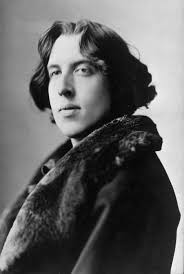The Picture of Dorian Gray Page #16
The Picture of Dorian Gray is a Gothic and philosophical novel by Oscar Wilde, first published complete in the July 1890 issue of Lippincott's Monthly Magazine. Fearing the story was indecent, prior to publication the magazine's editor deleted roughly five hundred words without Wilde's knowledge.
Lord Henry watched him with a subtle sense of pleasure. How different he was now from the shy frightened boy he had met in Basil Hallward's studio! His nature had developed like a flower, had borne blossoms of scarlet flame. Out of its secret hiding-place had crept his soul, and desire had come to meet it on the way. "And what do you propose to do?" said Lord Henry at last. "I want you and Basil to come with me some night and see her act. I have not the slightest fear of the result. You are certain to acknowledge her genius. Then we must get her out of the Jew's hands. She is bound to him for three years--at least for two years and eight months--from the present time. I shall have to pay him something, of course. When all that is settled, I shall take a West End theatre and bring her out properly. She will make the world as mad as she has made me." "That would be impossible, my dear boy." "Yes, she will. She has not merely art, consummate art-instinct, in her, but she has personality also; and you have often told me that it is personalities, not principles, that move the age." "Well, what night shall we go?" "Let me see. To-day is Tuesday. Let us fix to-morrow. She plays Juliet to-morrow." "All right. The Bristol at eight o'clock; and I will get Basil." "Not eight, Harry, please. Half-past six. We must be there before the curtain rises. You must see her in the first act, where she meets Romeo." "Half-past six! What an hour! It will be like having a meat-tea, or reading an English novel. It must be seven. No gentleman dines before seven. Shall you see Basil between this and then? Or shall I write to him?" "Dear Basil! I have not laid eyes on him for a week. It is rather horrid of me, as he has sent me my portrait in the most wonderful frame, specially designed by himself, and, though I am a little jealous of the picture for being a whole month younger than I am, I must admit that I delight in it. Perhaps you had better write to him. I don't want to see him alone. He says things that annoy me. He gives me good advice." Lord Henry smiled. "People are very fond of giving away what they need most themselves. It is what I call the depth of generosity." "Oh, Basil is the best of fellows, but he seems to me to be just a bit of a Philistine. Since I have known you, Harry, I have discovered that." "Basil, my dear boy, puts everything that is charming in him into his work. The consequence is that he has nothing left for life but his prejudices, his principles, and his common sense. The only artists I have ever known who are personally delightful are bad artists. Good artists exist simply in what they make, and consequently are perfectly uninteresting in what they are. A great poet, a really great poet, is the most unpoetical of all creatures. But inferior poets are absolutely fascinating. The worse their rhymes are, the more picturesque they look. The mere fact of having published a book of second-rate sonnets makes a man quite irresistible. He lives the poetry that he cannot write. The others write the poetry that they dare not realize." "I wonder is that really so, Harry?" said Dorian Gray, putting some perfume on his handkerchief out of a large, gold-topped bottle that stood on the table. "It must be, if you say it. And now I am off. Imogen is waiting for me. Don't forget about to-morrow. Good-bye." As he left the room, Lord Henry's heavy eyelids drooped, and he began to think. Certainly few people had ever interested him so much as Dorian Gray, and yet the lad's mad adoration of some one else caused him not the slightest pang of annoyance or jealousy. He was pleased by it. It made him a more interesting study. He had been always enthralled by the methods of natural science, but the ordinary subject-matter of that science had seemed to him trivial and of no import. And so he had begun by vivisecting himself, as he had ended by vivisecting others. Human life--that appeared to him the one thing worth investigating. Compared to it there was nothing else of any value. It was true that as one watched life in its curious crucible of pain and pleasure, one could not wear over one's face a mask of glass, nor keep the sulphurous fumes from troubling the brain and making the imagination turbid with monstrous fancies and misshapen dreams. There were poisons so subtle that to know their properties one had to sicken of them. There were maladies so strange that one had to pass through them if one sought to understand their nature. And, yet, what a great reward one received! How wonderful the whole world became to one! To note the curious hard logic of passion, and the emotional coloured life of the intellect--to observe where they met, and where they separated, at what point they were in unison, and at what point they were at discord--there was a delight in that! What matter what the cost was? One could never pay too high a price for any sensation. He was conscious--and the thought brought a gleam of pleasure into his brown agate eyes--that it was through certain words of his, musical words said with musical utterance, that Dorian Gray's soul had turned to this white girl and bowed in worship before her. To a large extent the lad was his own creation. He had made him premature. That was something. Ordinary people waited till life disclosed to them its secrets, but to the few, to the elect, the mysteries of life were revealed before the veil was drawn away. Sometimes this was the effect of art, and chiefly of the art of literature, which dealt immediately with the passions and the intellect. But now and then a complex personality took the place and assumed the office of art, was indeed, in its way, a real work of art, life having its elaborate masterpieces, just as poetry has, or sculpture, or painting. Yes, the lad was premature. He was gathering his harvest while it was yet spring. The pulse and passion of youth were in him, but he was becoming self-conscious. It was delightful to watch him. With his beautiful face, and his beautiful soul, he was a thing to wonder at. It was no matter how it all ended, or was destined to end. He was like one of those gracious figures in a pageant or a play, whose joys seem to be remote from one, but whose sorrows stir one's sense of beauty, and whose wounds are like red roses. Soul and body, body and soul--how mysterious they were! There was animalism in the soul, and the body had its moments of spirituality. The senses could refine, and the intellect could degrade. Who could say where the fleshly impulse ceased, or the psychical impulse began? How shallow were the arbitrary definitions of ordinary psychologists! And yet how difficult to decide between the claims of the various schools! Was the soul a shadow seated in the house of sin? Or was the body really in the soul, as Giordano Bruno thought? The separation of spirit from matter was a mystery, and the union of spirit with matter was a mystery also.
Translation
Translate and read this book in other languages:
Select another language:
- - Select -
- 简体中文 (Chinese - Simplified)
- 繁體中文 (Chinese - Traditional)
- Español (Spanish)
- Esperanto (Esperanto)
- 日本語 (Japanese)
- Português (Portuguese)
- Deutsch (German)
- العربية (Arabic)
- Français (French)
- Русский (Russian)
- ಕನ್ನಡ (Kannada)
- 한국어 (Korean)
- עברית (Hebrew)
- Gaeilge (Irish)
- Українська (Ukrainian)
- اردو (Urdu)
- Magyar (Hungarian)
- मानक हिन्दी (Hindi)
- Indonesia (Indonesian)
- Italiano (Italian)
- தமிழ் (Tamil)
- Türkçe (Turkish)
- తెలుగు (Telugu)
- ภาษาไทย (Thai)
- Tiếng Việt (Vietnamese)
- Čeština (Czech)
- Polski (Polish)
- Bahasa Indonesia (Indonesian)
- Românește (Romanian)
- Nederlands (Dutch)
- Ελληνικά (Greek)
- Latinum (Latin)
- Svenska (Swedish)
- Dansk (Danish)
- Suomi (Finnish)
- فارسی (Persian)
- ייִדיש (Yiddish)
- հայերեն (Armenian)
- Norsk (Norwegian)
- English (English)
Citation
Use the citation below to add this book to your bibliography:
Style:MLAChicagoAPA
"The Picture of Dorian Gray Books." Literature.com. STANDS4 LLC, 2025. Web. 17 Mar. 2025. <https://www.literature.com/book/the_picture_of_dorian_gray_869>.








Discuss this The Picture of Dorian Gray book with the community:
Report Comment
We're doing our best to make sure our content is useful, accurate and safe.
If by any chance you spot an inappropriate comment while navigating through our website please use this form to let us know, and we'll take care of it shortly.
Attachment
You need to be logged in to favorite.
Log In